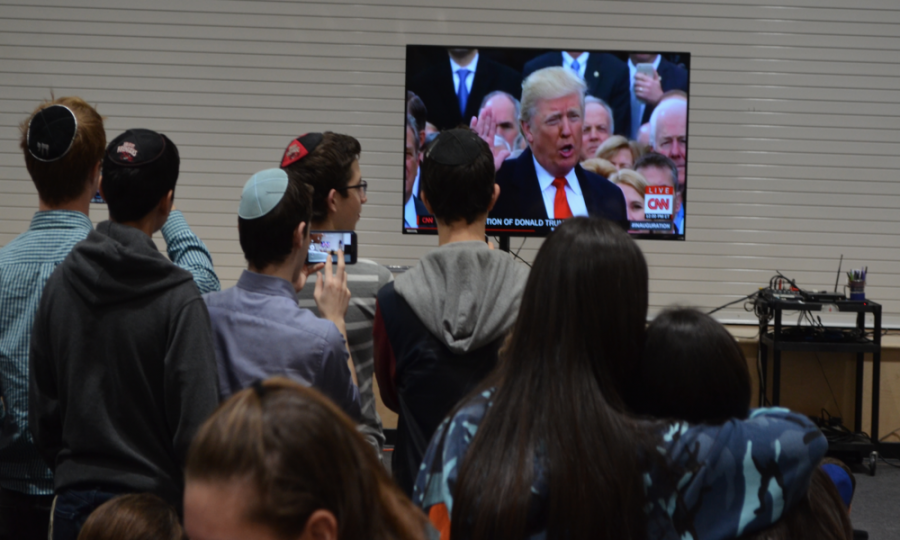OPINION: All views should be heard, including those on the right
OATH: Students watched President Trump’s swearing-in ceremony and inaugural address live in the gym Jan. 20.
September 8, 2017
By Asher Dauer, 11th Grade
Social, political, and religious openness are all things that immediately come to mind when thinking of Shalhevet. The school prides itself on giving students the ability to confidently offer ideas and opinions whether it’s during Town Hall or an average Tanach class.
However, over the course of my two years in Shalhevet, I’ve noticed a gradual transition in the opinions being offered. The evenly diverse environment that I was exposed to in my first year at Shalhevet has now become an environment which seems to be heavily left-leaning and intolerant. This transition has been visible in my (especially Judaic) classes and even in the Boiling Point itself.
Why has this happened? Students are afraid that they may be judged or thought of differently by classmates and even administrators if they offer a non-mainstream or “politically incorrect” approach.
For example, an event occurred in my Tanach class when we were discussing how we should view Jewish Americans who serve in the U.S. army as opposed to the IDF. A girl in my class said it was ideal for them to serve in the IDF, and as she was speaking, other kids in class shook their heads vigorously in disagreement. She did not speak again for the rest of class.
Teachers contribute to this fear as well by strongly expressing some of their views in classes. For example, the day after the presidential election a few teachers got extremely emotional, to the point of tearing up in front of the class. These emotional outbursts from teachers made it almost impossible for anyone in the class to express any kind of disagreement. Additionally, it surely embarrassed students who either supported President Trump themselves or whose family did.
Another example of this intolerance appeared in an issue of the Boiling Point from October, 2016. In this issue, two opinion pieces supposedly offered “two points of view” on the question of whether conservative pundit Ben Shapiro should have been allowed to speak at school. But both viewpoints were actually quite liberal. The supposedly conservative piece, by Clara Sandler — who defended his right to have appeared — called some of Shapiro’s views radical. The issue was that the pieces were not even about the merits of Mr. Shapiro’s actual points — neither piece even tried to entertain the thoughts of someone conservative. Instead they analyzed his right to share his opinion at a high school — surely the most basic right for those holding minority views in a democracy.
It is unlikely that making other students scared or embarrassed to express their opinion is anybody’s intention, but the reality is it is happening, and it is harming everyone. It is harming the nervous students, who find themselves unable to express their opinions and engage in class conversation. It is harming the inflicting students, because they are only hearing from others who agree with them, which does not strengthen their arguments.
And finally, it is harming the conversation as a whole, because a discussion which is completely run by one side of the spectrum is not a healthy one and doesn’t go anywhere. This harms the intellectual life of our school.
Although challenging, this unbalance of opinions is easily resolvable, and all it requires is a simple change of behavior. Teachers should promote discussion by challenging both sides of the argument as opposed to influencing the discussion in just one direction.
Additionally, when someone hears an opinion offered which they don’t necessarily agree with, instead of making condescending gestures or verbally attacking, they should disagree point by point, giving them the respect they and their ideas deserve. We should all be able to debate while not putting others in a position where they feel uncomfortable expressing their own view.
Beyond that, we should not only make each other feel comfortable, we should also listen to each other. This is what is needed if we truly want to restore the great sense of diversity and open feeling that Shalhevet was founded upon.













